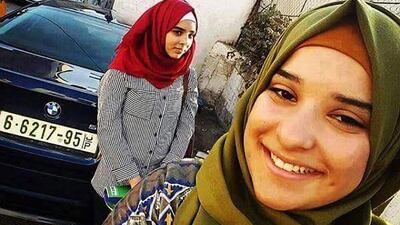QALANDIYA, West Bank // An Israeli police officer who killed a 14-year-old Palestinian girl when he repeatedly shot her as she lay on the ground has escaped prosecution.
The policeman opened fire on Hadeel Awwad as she tried to carry out an attack in Jerusalem in November with a cheap pair of scissors. Her cousin Norhan, 16, was also shot several times but survived.
The closing of the policeman’s case comes amid increasing anger over the number of teenage Palestinians killed in the current wave of violence and even concern within Israel’s military hierarchy. Palestinian leaders and human rights groups accuse the security forces of using excessive force and a “shoot-on-sight” policy in dealing with what Israel claims are attacks carried out or planned by Palestinians, usually with small knives.
Police investigators said last week they had decided not to prosecute the officer, whose name was not released, as there was no evidence he had criminal intent in his actions, Israeli media reported.
On the day of the attack, the cousins skipped classes and caught a bus to East Jerusalem where they prayed at Al Aqsa mosque and then made their way to Methane Yehuda market in West Jerusalem. They attacked two passers-by, causing minor injuries, before they were shot.
According to court documents the attack was an act of revenge carried out close to the anniversary of the death of Hadeel’s brother at the hands of Israeli soldiers.
Video footage shows the two girls waving scissors and lunging toward a man on the street. The man then points a gun at them and a police officer rushes in as another bystander flattens Norhan with a chair. The policeman shoots Hadeel, killing her, before firing shots into Norhan’s chest, and stomach.
The decision not to prosecute the officer “came as no surprise” to Hadeel’s older sister Haya.
“As we suspected the investigation went nowhere – we didn’t have trust in it from the beginning,” she told The National.
The Awwad family had to wait more than a month for their daughter’s body to be released by the Israeli military. Hadeel’s body was among the first to be returned, after delays intended to punish the families of those accused of attacks on Israelis.
“My heart was beating, I was scared – I was also incredibly sad because I remember so clearly the times when my sister was alive and walking and here I was collecting her corpse,” said Haya.
“Her body had eleven bullet holes, on both sides of her body, the police officer had turned her body over and shot her again in the chest, shoulder and neck – she was riddled with gunshots.”
Since Hadeel’s death, increasing numbers of young Palestinians have been killed in the five-month wave of violence.
More than 180 Palestinians and 29 Israelis have been killed since the end of September. Israel’s domestic security service claims most of these have been carrying out, or about to carry out attacks on Israelis. Shin Bet figures released last week said half of the 228 alleged attacks were carried out by Palestinians aged 20 and under. Ten per cent were children under 16. In 11 per cent of the cases, the alleged attackers were female.
The Israeli policeman who killed Hadeel is the first to face a criminal investigation during the current wave of violence. The complaint against him was that the girls posed no real danger.
The policeman claimed he shot the girls because he believed the danger had not yet passed. His lawyer said the officer arrived at the scene after the two girls had wounded the passers-by.
“In real time the policeman believed that the attackers constituted an immediate threat to life, and he thus sought to neutralise them,” the lawyer said.
If police officers and soldiers are not going to be held accountable, then the regulations are merely “empty rhetoric”, said Sarit Michaeli, spokeswoman for the human rights organisation B’Tselem.
“This is a very dangerous situation – there have been at least 12 cases where clear evidence is presented that excessive force was used in cases caught on television or video – many involving minors – there’s absolute clarity on the use of excessive, often lethal force being documented again and again and authorities still deny it.”
As the violence continues, the number of teenagers killed has even caused concern within Israel’s security services.
Israel’s army chief of staff Gadi Eisenkot raised concern about excessive force when asked about rules of engagement while addressing a group of high school students about to enter military service.
“The IDF cannot speak in slogans, such as ‘if someone comes to kill you, arise to kill them first,’ or ‘everyone who carries scissors should be killed. Troops can act only if there is threat to life.
“I don’t want a soldier to empty a magazine on a girl with scissors,” he added
His comments sparked an uproar among right-wing politicians in Israel, who accused him of not being supportive enough of his soldiers.
Yet in recent weeks, there has been a spike in the number of Palestinians killed. Earlier this month, a 17-year-old girl, a 17-year boy, and two 15-year old boys were killed by Israeli soldiers over two days in three separate incidents.
Hadeel’s cousin Norhan, who survived her wounds, is being detained in Hasharon prison. In December she was charged with two counts of attempted murder and possession of a deadly weapon, the scissors, by the Jerusalem District Juvenile Court.
Her sister Tasneem Awwad, 18, said she had been able to see her five times in the past three months.
“I cried when I first saw her – she could walk, but was limping. She didn’t believe our cousin Hadeel had died and she kept asking about Maliha [Hadeel’s mother].”
foreign.desk@thenational.ae

